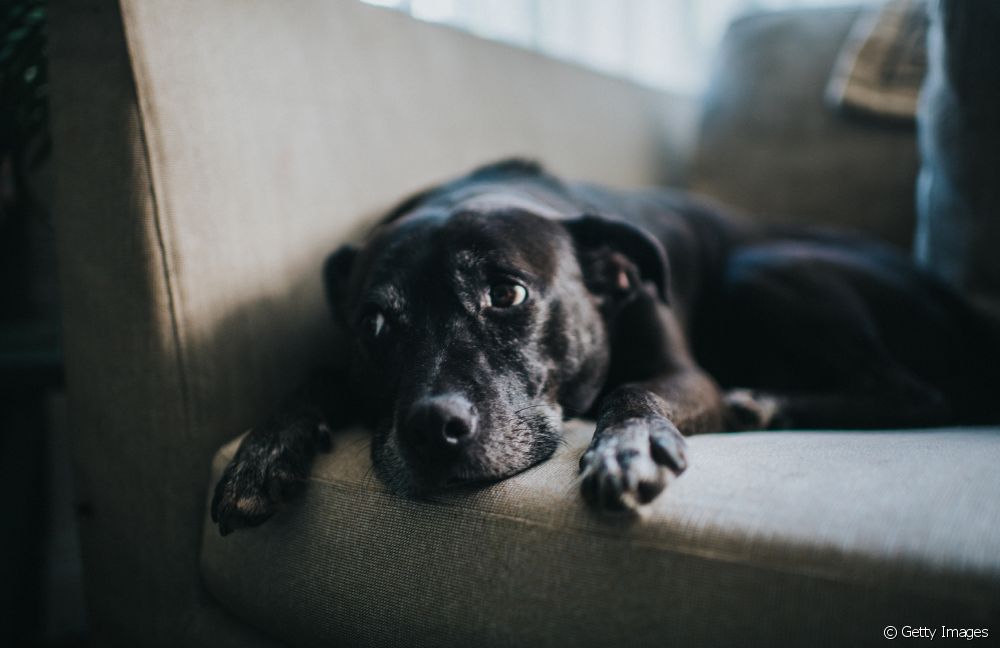Depression in dogs: what are the causes, most common signs and how is it treated?

Table of contents
Just like humans, dogs are not free from psychological and emotional problems. Depression in dogs, for example, is a more common disease than one might think. In this case, there are a number of reasons that can be behind a depressed dog, such as changes of home, the arrival of new members in the family or even the loss of loved ones. Canine depression can be caused byIt is therefore important to observe your friend to understand this behavior and thus find the best way to help him.
What causes depression in dogs?
Contrary to what some guardians think, dogs can also develop depression. When this happens, it is common for the guardian to notice his friend extremely quiet, with a sad look, without appetite and with very little energy. According to Renata Bloomfield, veterinarian and animal behaviorist. the causes for the disease can range from the loss of a loved one to a change in the body."When someone in the family passes away or moves house, whether it's a person or a pet, the dog suffers from grief that can result in depression," she explains. As well as leaving, the arrival of new members in the house can also mess with the animal's psychological state. "A new pet in the house, for example, generates changes in the routine, which can make him feel left out or left behind.This is why you need to dedicate some of your time to your four-legged friend and even encourage them to get closer to their new member (always safely, of course).
In addition, the relationship of the guardian with his pet can also greatly influence the picture. In some cases, the dominance exercised by the human can make the animal feel afraid and afraid to take any action, resulting in a depressed and sad dog. Therefore, the specialist warns: it is necessary to invest in positive training and avoid aggressive commands to ensure the well-being of the pet.your pet.
Dog with depression: symptoms to watch out for by the guardian
When it comes to a depressed dog, the animal will always show signs that something is not going well. Renata clarifies: "The depressed dog usually keeps his ears and tail down throughout the day. The habit of wagging his tail is also lost." In addition, if you notice that your puppy walks with a sad look and more in his own, it is important to turn on the warning signal. This is because the lack of attention is a sign of depression.disinterest can also be a symptom of depression in dogs. "A lively and playful dog, for example, may become isolated and not interact as much with his family," warns the behaviorist. Another sign that your dog's mental health may be compromised is the lack of appetite, since a depressed dog tends to lose stimulation even for the most pleasurable moments, such as themeals.

How to help a dog with depression?
We know that it is not always easy to control our emotions. But in the case of a depressed dog, it is worth adopting some habits and care to give your friend a boost in life and thus help him deal with illness. In this sense, the behaviorist recalls that depressed dogs should be stimulated with activities in their routine. "As with humans, the animal's idle time canTherefore, it is important to introduce interactive games to create new connections and pleasures, "he says. Try to set aside a period of your day to walk with your dog. During the walk, allow the animal to approach and interact with other pets and people. In the case of a depressed dog due to family losses, the best solution is to try to strengthen even moreA few minutes with his company will be good for both of you.
Depression: dogs can overcome it with a few precautions
Before starting the treatment of your friend's depression, it is important that the animal undergoes a medical evaluation to identify the source of the problem. "The diagnosis of depression in dogs is made from the animal's history. In this case, questions about their routine, behavior and recent changes are usually asked, since every detail can make a difference in the process of depression.Generally, the behavioral consultation is around one and a half," he says.
See_also: The mystery of the gatoraposa! Scientists investigate possible subspecies of felinesAfter that, it is possible to start the treatment that can vary from the inclusion of games and activities in the animal's routine to therapies with pheromones or allopathies. In the first case, walks and walks are a great way to lift the animal's mood. In situations where the use of medication is recommended, it is important to keep up with the professional to ensure the animal's health.In addition, it is worth mentioning that antidepressants should not be used as a way to dope the animal. The veterinarian's recommendations should be followed to the letter.

